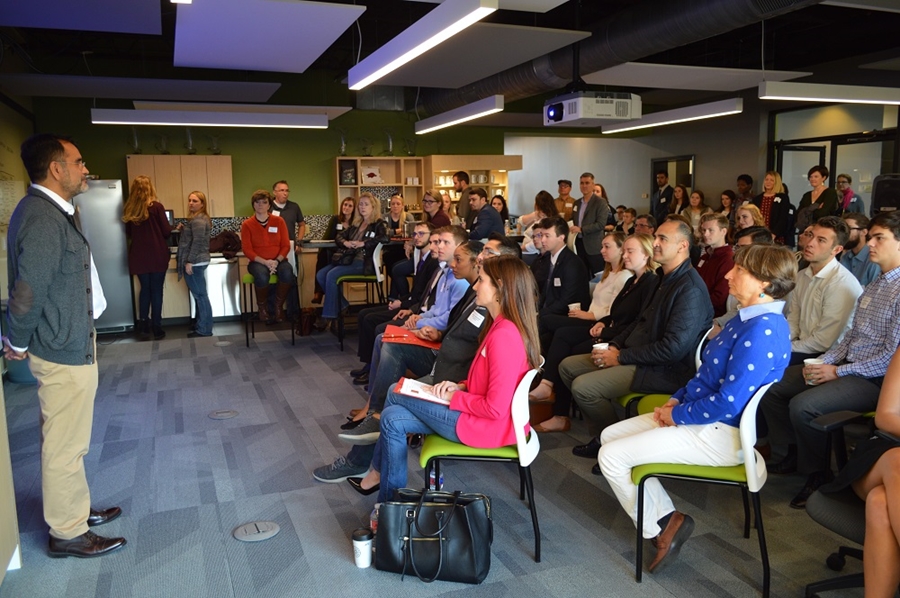
Often things are too close to call, and such was the case when student teams pitched their social and environmental design solutions to a panel of faculty and expert judges at the second annual Social Innovation Challenge. On Saturday, Dec. 2, two interdisciplinary teams received top honors in the annual competition and were awarded funding to be applied toward a conference or other professional opportunity.
The winning teams included:
- Copeland James, a junior management major in the Walton College of Business, and Raissa Araujo Borges, a graduate student in mechanical engineering. Copeland and Borges presented a sustainable solution to a problem posed by Rockline Industries: how to recycle the waste material created by the production of industrial wipes, one of the company's primary product lines. The team proposed using the wipe substrate as a liner in chicken bedding, changing the chemical composition of the material so it ultimately could be used as a fertilizer product.
- Emily Antonenko, a senior French major; Chris David, a senior management major; Dylan Devine, a senior finance major; and Kacie Watson, a senior marketing major, all in the Walton College of Business. The team addressed a challenge posed by Spectrum Living Solutions, a community of resources for adults with developmental disabilities. Spectrum invited students to brainstorm on different micro- or small business strategies to generate revenue streams for SLS and employment opportunities for individuals with autism. The team proposed a mobile coffee truck that would serve as both a micro-business and a mobile marketing tool, allowing SLS clients to engage with the community.
The Social Innovation Challenge is the annual capstone event of the University of Arkansas Social Innovation Initiative, a collaboration of multiple faculty members and external organizations led by Rogelio Garcia Contreras, director of social innovation. The initiative offers University of Arkansas students, faculty and staff the opportunity to learn about pressing social and environmental problems defined by partner organizations (many of them local).
"Having two teams with incredibly diverse solutions showcases the essence of this project," said Jacqueline Tilton, a doctoral candidate and instructor in the Walton College Department of Management. Both teams participated in Tilton's fall section of Ethics and Corporate Social Responsibility, one of nine courses participating in the Social Innovation Initiative. "Organizations of all types can find innovative solutions that do good in the community and beyond, from Rockline Industries, a for-profit paper manufacturer dedicated to sustainability, to SLS, a non-profit committed to improving the well-being for those on the autistic spectrum and their families."
During the fall 2017 semester, students formed 16 interdisciplinary teams to tackle these problems using entrepreneurial principles and business disciplines. The area organizations that submitted challenges were Arkan-Code, Canopy, NWA Continuum of Care, Elizabeth Richardson Center, InkDwell, KYYA Chocolate, Chew and Charity Solutions, Rockin' Baker, Rockline Industries, Spectrum Living Solutions, Storyville, and Tri Cycle Farms. The purpose of the competition is to showcase the innovative solutions and ideas that the students developed, with four finalist teams presenting ideas on behalf of Spectrum Living Solutions, Storyville, Rockline Industries, and Northwest Arkansas Continuum of Care.
Sarah Brown, the business development manager at Heifer International, delivered a keynote talk on social entrepreneurship at the day-long event. Brown said, "It was an honor to be part of the Social Innovation Challenge. This type of thinking is required in undergraduate education to prepare the next generation of leaders. I was impressed by the unique approaches students took to solve complex social problems." Brown was also one of eight judges. "At Heifer, this methodology and approach is exactly what we instill in our staff and those with which we work in the field. There is so much opportunity in the social enterprise sector, and I am excited to see it take form at the University of Arkansas," she added.
About the Office of Entrepreneurship and Innovation: The mission of the University of Arkansas' Office of Entrepreneurship and Innovation is to catalyze entrepreneurial activities and innovation across the university and throughout the state in order to build Arkansas' knowledge-based economy and support healthy, sustainable communities.
About the University of Arkansas: The University of Arkansas provides an internationally competitive education for undergraduate and graduate students in more than 200 academic programs. The university contributes new knowledge, economic development, basic and applied research, and creative activity while also providing service to academic and professional disciplines. The Carnegie Foundation classifies the University of Arkansas among only 2 percent of universities in America that have the highest level of research activity. U.S. News & World Report ranks the University of Arkansas among its top American public research universities. Founded in 1871, the University of Arkansas comprises 10 colleges and schools and maintains a low student-to-faculty ratio that promotes personal attention and close mentoring.
Contacts
Sarah Goforth, director of outreach
Walton College of Business
479-225-7185,
David Speer, director of communications
Sam M. Walton College of Business
479-575-2539,